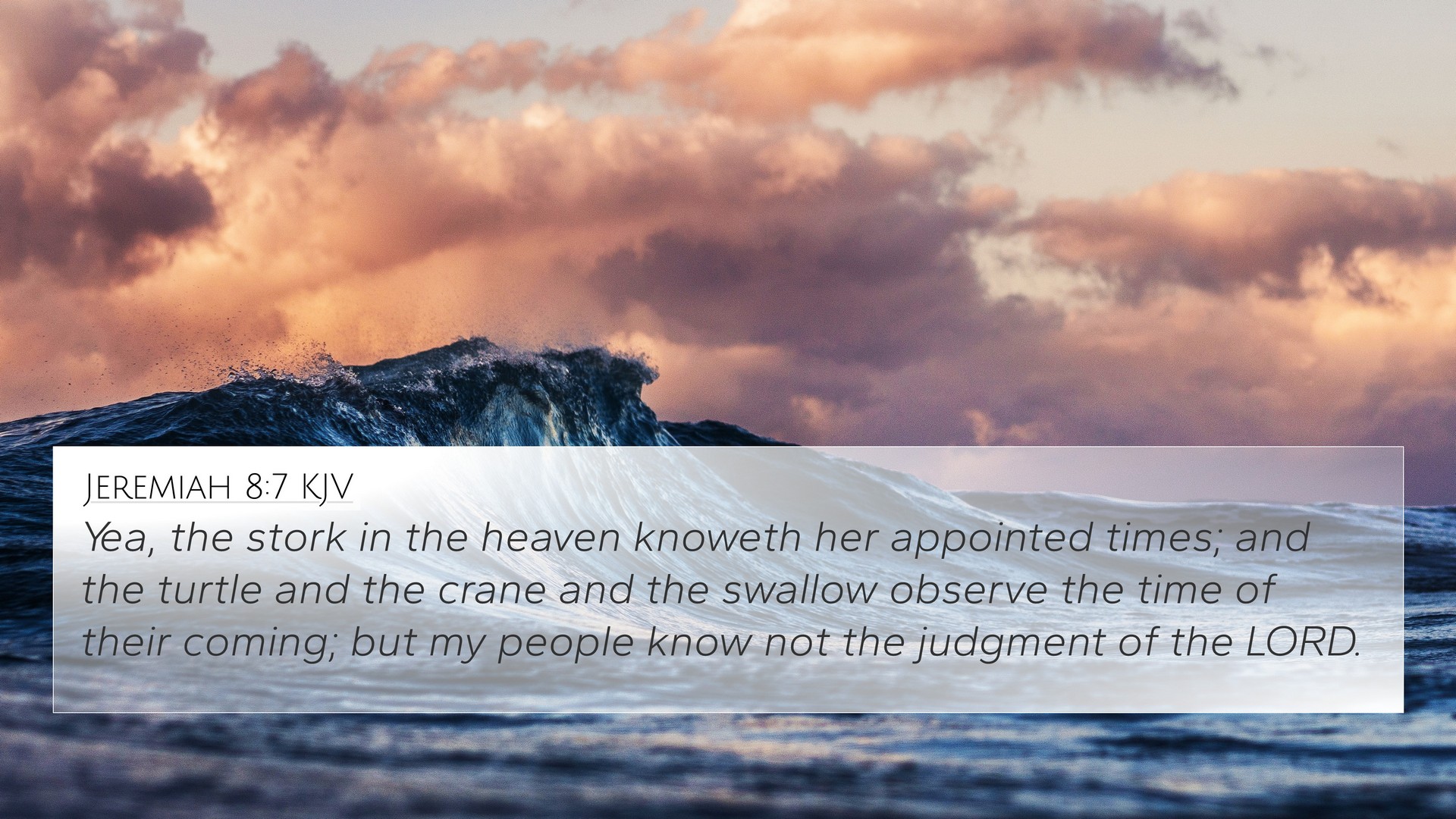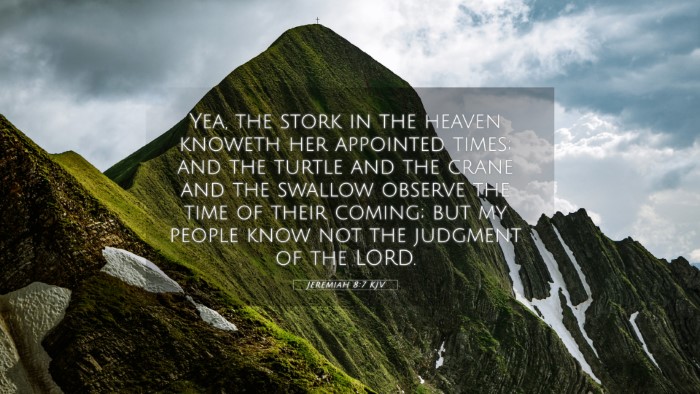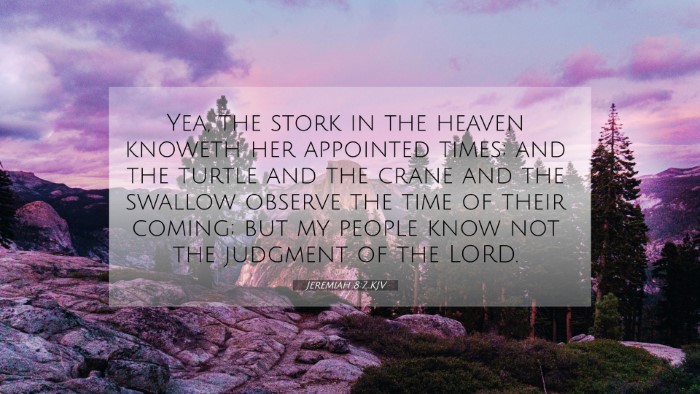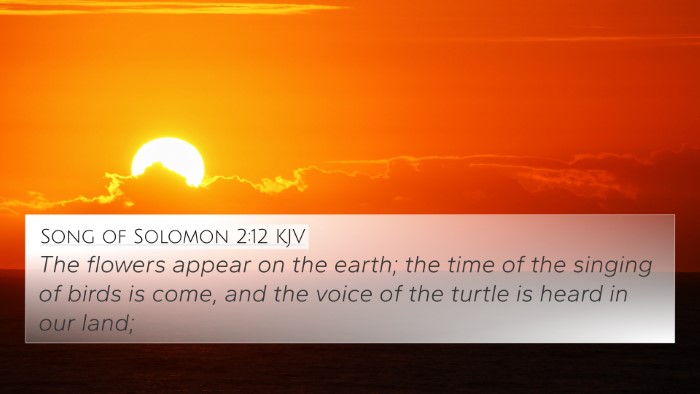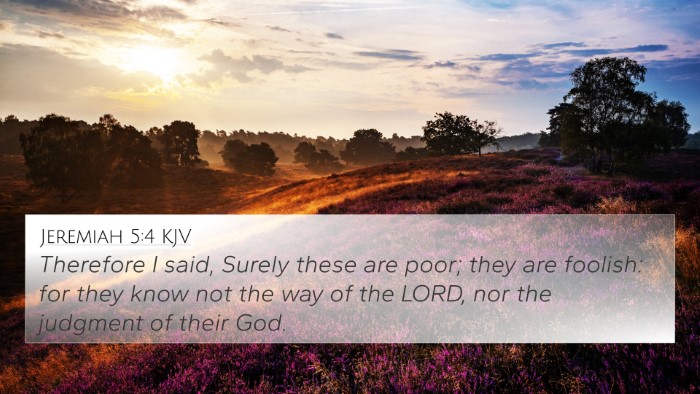Understanding Jeremiah 8:7
Jeremiah 8:7 states, "Yea, the stork in the heaven knoweth her appointed times; and the turtle and the crane and the swallow observe the time of their coming; but my people know not the judgment of the LORD." This verse highlights a stark contrast between the instinctual behavior of animals and the lack of awareness displayed by the people of Judah regarding God's judgments.
Analysis of the Verse
This verse serves as an indictment against the people of Israel for their spiritual blindness. The comparison between migratory birds and the people of God encapsulates a profound message regarding divine understanding and recognition of time and seasons.
- Matthew Henry: Henry emphasizes the natural instinct of the stork and other birds, which know when to migrate. This normal behavior contrasts sharply with the unnatural ignorance of the people, suggesting a decline in spiritual insight.
- Albert Barnes: Barnes reflects on the use of birds as symbols of divine messengers. The lack of discernment among God’s people is seen as a refusal to acknowledge the times of visitation, revealing deeper issues within their spiritual life.
- Adam Clarke: Clarke points out that the phrase "my people" signifies a covenant relationship. Their ignorance of the judgment of the Lord reflects a deeper disconnection from their spiritual calling and duties.
Thematic Connections and Cross-References
Jeremiah 8:7 can be linked to several other Bible verses that emphasize the theme of awareness and understanding of God’s will and judgments. Here are some notable cross-references:
- Hosea 4:6: "My people are destroyed for lack of knowledge." This verse highlights the consequences of spiritual ignorance.
- Isaiah 1:3: "The ox knoweth his owner, and the ass his master's crib: but Israel doth not know, my people doth not consider." This further emphasizes the theme of God's people failing to recognize their Maker.
- Matthew 16:3: "And in the morning, It will be foul weather today: for the sky is red and lowering. O ye hypocrites, ye can discern the face of the sky; but can ye not discern the signs of the times?" A New Testament reflection on recognizing spiritual signs.
- Romans 1:20: "For the invisible things of him from the creation of the world are clearly seen, being understood by the things that are made." This connects the natural world to divine knowledge.
- Proverbs 1:22: "How long, ye simple ones, will ye love simplicity?" A call for understanding and wisdom from God.
- Luke 19:44: "And they shall lay thee even with the ground, and shall not leave in thee one stone upon another; because thou knewest not the time of thy visitation." Relating to the recognition of God's judgment upon Jerusalem.
- Amos 3:7: "Surely the Lord God will do nothing, but he revealeth his secret unto his servants the prophets." This emphasizes God's communication with His people.
Implications for Believers
This verse serves as a reminder for believers to stay attuned to God’s voice and to the signs of the times. Here are a few considerations:
- Spiritual Awareness: Believers must cultivate a deep awareness of God’s work in their lives and in the world around them.
- Response to God's Judgment: Understanding God’s judgment requires an openness to His revelations and teachings through scripture.
- Learning from Creation: The natural world serves as a reminder of God’s order and timing, urging us to align our lives with His will.
- Community Responsibility: Like the Israelites, today’s believers are called to encourage each other in understanding God’s truths.
Conclusion
Jeremiah 8:7 serves as a powerful call to recognition and responsiveness to God's judgments. The connections with other biblical texts enrich our understanding of this theme and remind us of the vital importance of being spiritually discerning.
As we study this verse alongside its related scriptures, we enhance our knowledge of the Bible and draw closer to the heart of God, becoming more attuned to His messages and the lessons they contain.
